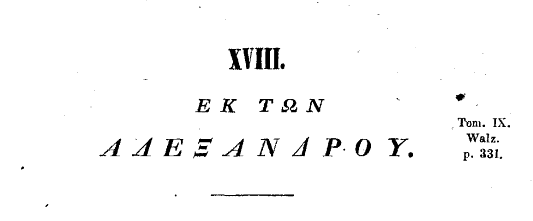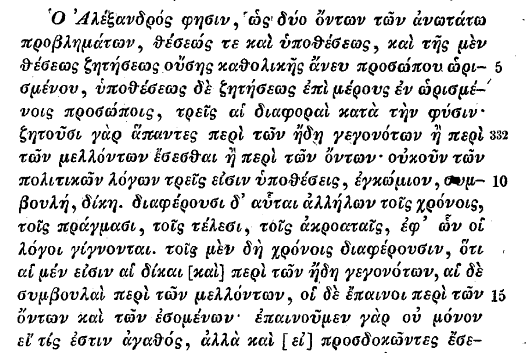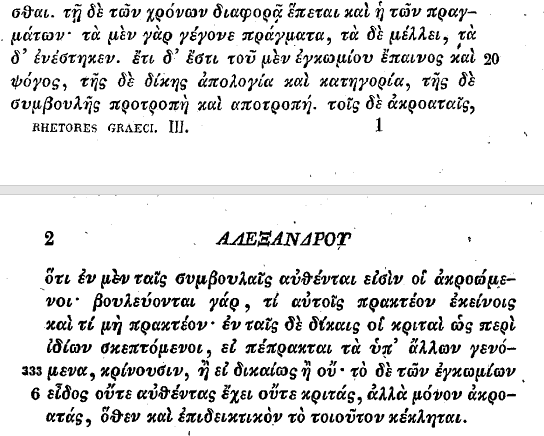The text is in Leonardi Spengel’s collection Rhetores Graeci (Lipsiae: Teubneri 1856), in chapter 18, which is entitled ΕΚ ΤΩΝ ΑΛΕΧΑΝΔΡΟΥ, that is, ‘From the [works] of Alexander’, and both occurrences of the word αὐθέντης occur in the first section, on page 2 at lines 1 and 6:
Ὁ Ἀλέξανδρός φησιν, ὡς δύο ὄντων τῶν ἀνωτάτω προβλημάτων, θέσεώς τε καὶ ὑποθέσεως,
Alexander says: As there are two over-arching matters, a θέσις (undefined question) and a ὑπόθεσις (defined question),
καὶ τῆς μὲν θέσεως ζητήσεως οὔσης καθολικῆς ἄνευ προσώπου ὡρισμένου,
and the former being a general discussion without a defined aspect,
ὑποθέσεως δὲ ζητήσεως ἐπὶ μέρους ἐν ὡρισμένοις προσώποις,
but the latter being a discussion with defined aspects in part,
τρεῖς αἱ διαφοραὶ κατὰ τὴν φύσιν·
there are three natural distinctions to be made.
ζητοῦσι γὰρ ἅπαντες περὶ τῶν ἤδη γεγονότων ἢ περὶ τῶν μελλόντων ἔσεσθαι ἢ περὶ τῶν ὄντων·
For all are seeking for the things that have already been, and the things that are about to be, and the things that are;
οὐκοῦν τῶν πολιτικῶν λόγων τρεῖς εἰσιν ὑποθέσεις, ἐγκώμιον, συμβουλή, δίκη.
Accordingly, there are three specific forms of political speeches:
the eulogy/panegyric, the discussion/deliberation, and the court-case/judgement.
διαφέρουσι δ’ αὗται ἀλλήλων τοῖς χρόνοις, τοῖς πράγμασι, τοῖς τέλεσι, τοῖς ἀκροαταῖς, ἐφ’ ὧν οἱ λόγοι γίγνονται.
But these differ from one another in times, in events, in goals, [and] in the hearers, upon whom the speeches come.
τοῖς μὲν δὴ χρόνοις διαφέρουσιν, ὅτι αἱ μέν εἰσιν αἱ δίκαι [καὶ] περὶ τῶν ἤδη γεγονότων, αἱ δὲ συμβουλαὶ περὶ τῶν μελλόντων, οἱ δὲ ἔπαινοι περὶ τῶν ὄντων καὶ τῶν ἐσομένων·
Now they differ in respect of time, because the judgements concern things which have already happened, whereas the deliberations concern things which are about to be, and the eulogies concern the things which are and which will be.
ἐπαινοῦμεν γὰρ οὐ μόνον εἴ τίς ἐστιν ἀγαθός, ἀλλὰ καὶ [εἰ] προσδοκῶντες ἔσεσθαι.
For we praise, not only if someone is good, but also if we are expecting that they will be.
τῇ δὲ τῶν χρόνων διαφορᾷ ἕπεται καὶ ἡ τῶν πραγμάτων·
Also, the difference with respect to events is in accord with the difference in respect to time.
τὰ μὲν γὰρ γέγονε πράγματα, τὰ δὲ μέλλει, τὰ δ’ ἐνέστηκεν.
For some events have taken place, others will in future, others are underway.
ἔτι δ’ ἔστι τοῦ μὲν ἐγκωμίου ἔπαινος καὶ ψόγος, τῆς δὲ δίκης ἀπολογία καὶ κατηγορία, τῆς δὲ συμβουλῆς προτροπὴ καὶ ἀποτροπή.
But still [with regard to] the public speech, there is [both] praise and censure, [with regard to] judgement (or lawsuit) there is defence and accusation/prosecution, [with regard to] deliberation there is exhortation [persuasion] and dissuasion.
τοῖς δὲ ἀκροαταῖς, ὅτι ἐν μὲν ταῖς συμβουλαῖς αὐθένται εἰσὶν οἱ ἀκροώμενοι·
And [they differ] with respect to the listeners, because in deliberations the ones who hear are [also] the ones who speak and act [having autonomy so to do].
βουλεύονται γάρ, τί αὐτοῖς πρακτέον ἐκείνοις καὶ τί μὴ πρακτέον·
For they deliberate upon what action is to be taken, and what is not to be taken by them, themselves.
ἐν ταῖς δὲ δίκαις οἱ κριταὶ ὡς περὶ ἰδίων σκεπτόμενοι, εἰ πέπρακται τὰ ὑπ’ ἄλλων γενόμενα, κρίνουσιν, ἢ εἰ δικαίως ἢ οὔ·
In the court cases, the judges, as concerning private matters, and considering carefully, judge as to whether the things that have been done by others have in fact occurred, or [sc. if indeed they have] as to whether (they have been committed) justly or not.
τὸ δὲ τῶν ἐγκωμίων εἶδος οὔτε αὐθέντας ἔχει οὔτε κριτάς, ἀλλὰ μόνον ἀκροατάς, ὅθεν καὶ ἐπιδεικτικὸν τὸ τοιοῦτον κέκληται.
But the form of eulogies has neither doers/agents/actors nor judges/deciders but only listeners, which is why such a form is also called epideictic (for the display of rhetorical or oratorical skill).
Andrew


